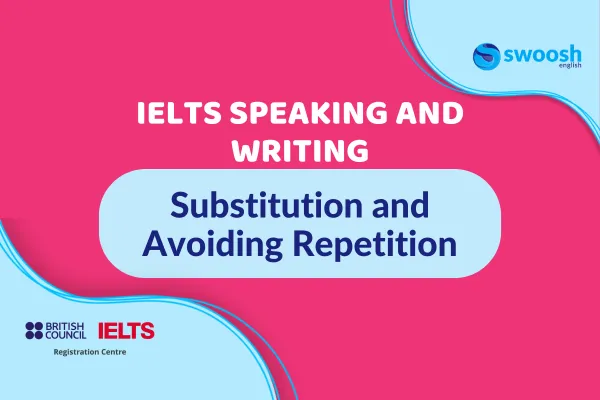Want to pass your OET exam faster?
Blog
Dive into our OET, IELTS or PTE blogs full of tips and strategies so you can achieve your goal of passing your exam with confidence.


Substitution and Avoiding Repetition in IELTS Speaking and Writing
In both spoken and written English, repetition can make sentences sound redundant or clumsy. To enhance your IELTS speaking and writing skills and achieve a band score 7 or higher, it is essential to use substitution techniques effectively. This article explores various types of substitution, including pronouns, indefinite quantifying pronouns, verb-noun transformations, ellipsis, and synonyms.
Types of Substitution
Pronouns
Personal pronouns: Used to replace noun phrases referring to people or things previously mentioned.
Example: I can speak Japanese quite well. I've been learning it for several years.
Possessive pronouns: Replace noun phrases to indicate possession.
Example: To ensure that our sales staff speak to customers appropriately, management has made the decision to send them on a training course.
Indefinite Quantifying Pronouns
Include words like little, many, enough, none, etc., to replace specific quantities or qualities.
Example: There were two choices on the menu, but I didn't like either.
Substituting with 'Do'
'Do,' 'do so,' 'do it,' 'do the same' are used to replace a verb and its complement.
Example: None of the team understood the problem at first, but they did after a few days.
Substituting with 'Such' and 'So'
'Such' is used to mean 'this or that kind,' while 'so' is used in various contexts, including as an adjective and with reporting verbs.
Example: Many people believe that we need to recycle more, and I think so too.
One, Some, Ones
Used to substitute countable nouns.
Example: They looked at several houses but couldn't find one they both liked.
Exercises
Exercise 1
In each sentence, identify the type of substitution used (personal pronouns, possessive pronouns, indefinite quantifying pronouns, substitution with 'do,' substitution with 'such' and 'so,' or one/some/ones substitution).
I've been practising the piano every day, and I'm getting better at it.
The manager praised our team's performance, which boosted our morale.
Some customers were dissatisfied with the service, so they requested a refund.
Mary couldn't attend the meeting, but she sent her assistant to represent her.
The students found the exam challenging, yet they managed to complete it on time.
The CEO announced a new policy, and everyone had to adhere to it.
John bought three new books, but he hasn't read any of them yet.
The professor recommended several research papers, so we read a few of them.
Mark's presentation was impressive, so I decided to do the same in my project.
The company faced financial difficulties, but they overcame them with strategic planning.
Exercise 2
Add suitable substitution words to sentences 1-7.
Nothing is ever the way you expect ___ to be.
Do you know who the Marketing Manager is? _____Julie Sanderson.
I don’t know ___ she’s working for now.
We decided to keep the leftover food for __________.
The computer will turn _______off if you don’t use it.
Mr. Jarvis and his co-worker in the States write to _______ every week.
Somebody phoned and said _____ wanted to see you
Answers
Exercise 1
Personal pronoun substitution
Indefinite quantifying pronoun substitution
Personal pronoun substitution
Personal pronoun substitution
Substitution with 'do'
Substitution with 'it'
Indefinite quantifying pronoun substitution
Substitution with 'some'
Substitution with 'do the same'
Substitution with 'they'
Exercise 2
Nothing is ever the way you expect it to be.
Do you know who the Marketing Manager is? It’s Julie Sanderson.
I don’t know who she’s working for now.
We decided to keep the leftover food for ourselves.
The computer will turn itself off if you don’t use it.
Mr. Jarvis and his co-worker in the States write to each other every week.
Somebody phoned and said they wanted to see you.
We hope this article has helped you appreciate the importance of using substitution terms to avoid unnecessary repitition and help to make your writing more natural. Let us know if you have any questions in the comments below.
You are invited to a FREE Masterclass
with expert teacher Scott!
Discover essential exam strategies
& learn how to save $1000s on your exam preparation.

